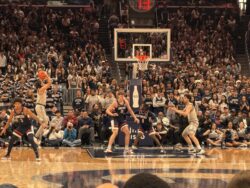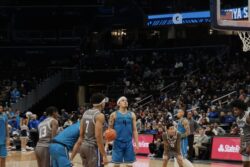Many have questioned over the years whether the punishments doled out by NFL Commissioner Roger Goodell have fit their respective crimes. Similarly, yesterday’s actions in the wake of overwhelming evidence that the Saints organization offered cash payouts to defensive players for inflicting game-ending injuries on opponents were met with considerable skepticism by the accused parties. The most high-profile of those punished, Saints’ Head Coach Sean Payton, was issued a season-long ban without pay, sending shockwaves around the league. But if these allegations are indeed true, then Payton got off easily.
Since he took over as commissioner in 2006, Goodell has campaigned persistently for increased player safety. Though well intentioned, his policies and punishments have not always met warm welcome from players, who feel that his strict interpretation of the rules has an overbearing impact on the culture and execution of the game. Rather than protecting players, many argue he has tried to control them, shaping the game to fit an idealized image of sportsmanship and safety instead of truly listening to the desires of the players themselves.
On Oct. 19, 2010, for example, Goodell fined three different players for dangerous hits during the previous weekend of games. “It is clear to me that further action is required to emphasize the importance of teaching safe and controlled techniques, and of playing within the rules,” he said of the decision. Linebacker James Harrison of the Pittsburgh Steelers alone was fined an incredible $75,000 for a hit that inflicted a concussion on an opposing receiver. Harrison was firmly defended, however, by influential teammate and former NFL Defensive Player of the Year Troy Polamalu, who argued Goodell’s power was too unchecked and taking the game away from the players.
But there is no doubt that Goodell’s heavy-handedness has been necessary for the league, which has been increasingly criticized over the past few years, not only for high rates of injury, but also for the long-term health of former players.
Wednesday’s events offer no better example of this need for regulation and enforcement of on-field player conduct. These disturbing allegations not only demonstrate that players are being unnecessarily put in harm’s way, but also that this dangerous behavior is being encouraged—and even rewarded—by the front office and coaching staff.
This culture is both dangerous and immoral, as individuals’ careers are being put on the line. Hence, Payton’s surprise that he will miss an entire season and close to $8 million in salary is entirely unfounded. For putting the well-being of other players in jeopardy, he at least deserves to have his own welfare temporarily challenged.
Goodell has also done right by not merely naming a scapegoat, but tackling the problem on multiple fronts. While Payton deserves considerable punishment, he is by no means alone in perpetrating the bounty culture. The league has also fined and suspended Saints General Manager Mickey Loomis, as well as removing the Saints’ next two second-round draft picks. The NFL has gone after the future of the organization, not paralyzing the team, but certainly curtailing its ability to improve personnel in the offseason. Furthermore, the league has suspended former Saints defensive coordinator and current St. Louis Rams defensive coordinator Gregg Williams, demonstrating that individuals will be held accountable even after they cut their ties with the accused organization.
These sanctions set an important precedent for future cases in the league. While Payton and the Saints may be stunned by their punishments, they have hopefully learned an important lesson, along with any teams that may be committing similar violations. Their behavior was simply unconscionable, and thus required a hefty sentence. Justice has been served, and while Saints fans might not be happy, this is an important step toward making the NFL a more safe and honorable league.



